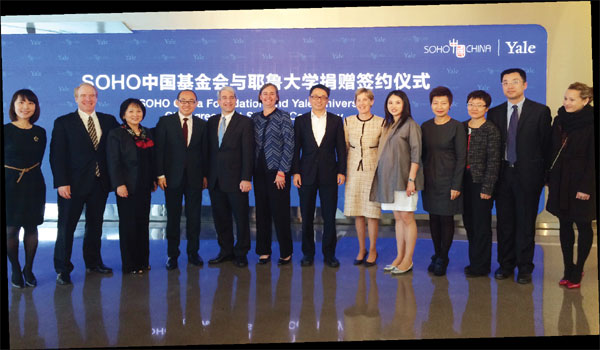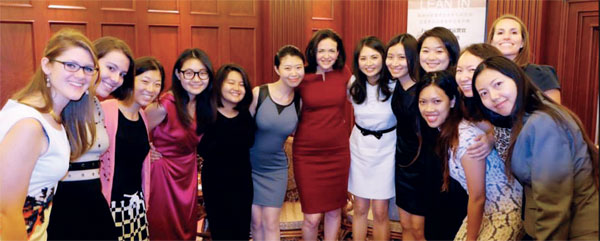Building bridges to China
Updated: 2015-03-23 07:28
By Fan Feifei(HK Edition)
|
|||||||
Carol Li was a successful legal professional in the US until the prospect of getting to watch China's growth story up close brought her back home. Fan Feifei profiles the lady who helps people connect across cultures.
Hong Kong-born Carol Li, now managing director of Yale Center Beijing, is building a bridge to help Hong Kong leaders, scholars and business professionals to learn more about the mainland. She wants to share how her early struggles crossing the cultural divide were turned into triumphs after she left her high-profile job in the United States to work in the place she has always considered the land of opportunity.
Li's grandfather was Ronald Li, founder of the Hong Kong Stock Exchange. Her uncles, David Li and Arthur Li, are chairman and vice-chairman of the Bank of East Asia. Her uncle Andrew Li became the first Chief Justice of Hong Kong in July 1997.
"I live in a family where my uncles and aunts have done very important work in banking, finance and law, which are the fields I am naturally interested in. It also very well aligns with the future of Hong Kong and the mainland, so I chose to study economics and law at university," she says.
"My family has been a great resource to me, and I have had the urge to contribute to the development of our country like the older generations of my family have," she adds, "Hong Kong provided me with the tools and environment to succeed and thrive, so I want to give back to society."
She started her education at St Paul's Co-educational College Primary School in Hong Kong, went to the US at 12, graduated from Yale University, with a double B.A. in economics and international studies, received a Doctor of Jurisprudence degree from Stanford University Law School, and served as an editor of the Stanford Law Review. She also worked for a couple of years at a number of renowned international law firms in New York, including Sullivan and Cromwell's, at the firm's headquarters.
Li always considered China her home but it was mere happenstance that brought her back to it. While attending a conference in 2007, she met Wei Christianson, CEO of Morgan Stanley China. "She told me the economy in China had been growing quickly and encouraged younger professionals like me to go to China and contribute to the economic development. I was curious, so I came back without hesitation."
Li took a post as senior vice-president at the China Investment Corporation (CIC), China's sovereign wealth fund, after she arrived in Beijing in 2008, around the time the Olympics started. She was at CIC for four years, working on private and public equity investments.
Female power
Language was her biggest problem. She couldn't speak Putonghua. She bought books, watched TV, talked to friends and as many people from as many different fields as she could. Today she's fluent, and she's learned about the ancient traditions of her own culture.
Li said she has always had a passion for women's causes. She co-founded Lean in Beijing, a professional network of over 20,000 women across China, which helps professional women from many fields to advance in leadership roles. The group was inspired by the book Lean In, written by Facebook COO Sheryl Sandberg.
"Young professional women need organizations like this, to share their own stories, their career ideas and to encourage each other to achieve their goals. I've met a lot of interesting women through the group. I've learned to understand the demands and challenges on the career path, and offer possible solutions."
When the Yale Center Beijing opened last October, Li became its managing director. With her Chinese and Western schooling, her family and professional network, Li was the perfect choice. The 16,500-square-foot facility in Beijing's Chaoyang District has become a convening place for Yale University to broaden the scope of its activities, and to form new partnerships with agencies and organizations. That's Li's principal role - to facilitate academic and cultural dialogue among the Chinese mainland, Hong Kong and the US. Her job is to form liaisons with key business, government and academic leaders - and devise new programs and events.
"Yale University has a long history of welcoming students from China. Yung Wing graduated from Yale in 1854, becoming the first person from China to earn a degree from an American university," Li says.
"The center was funded by two Yale alumni and one Yale friend, including Neil Shen, founding managing partner of Sequoia Capital China, Bob Xiaoping Xu, founding partner of ZhenFund.com, and Brad Huang, founder of Lotus Capital Management."
Li, 35, married Colm Rafferty, Asia-Pacific CEO for a US multinational Vermeer Corporation - an agricultural, infrastructure and mining equipment manufacturer. Rafferty is an alumnus of the Yale School of Management. The couple now has two children, the older son is 3 and the second around 4 months old.
"I like yoga, swimming, reading for myself and to my children. I play the piano and the ukulele. We have no pets in Beijing, though both my husband and I grew up with dogs."
"I met my husband two weeks after I arrived in Beijing, and we got engaged 4 weeks later. That was 2008. My husband had already lived in Beijing for 5 years, so he helped me to get acclimated to Beijing. It took some time to get used to the vastness in Beijing, but it helps that we later purchased a car."
The common link
Probably it's because she came from Hong Kong in the first place, that Li is particularly interested in creating a communications bridge between the mainland and Hong Kong. She serves on the board of directors of the Hong Kong Professionals (Beijing) Association.
"This year we will be inviting leaders from diverse fields in Hong Kong to the Yale Center Beijing to meet with successful Yale alumni, government officials and business leaders in Beijing. That will create a window for Hong Kong people to learn more about the mainland," Li said.
Li acknowledges tensions between people from her hometown and those from the mainland. She believes it's probably because Hong Kong was a colony for such a long time that people in the SAR may have lost touch with their historic roots and their ancient culture - and possibly don't understand the modern history of the mainland.
"Beijing is more international than Hong Kong. The leaders I can convene in Beijing are more international than those in Hong Kong. Through a series of exchanges and events, I believe I can help more Hong Kong people to learn about the development and achievements of Beijing."
"In fact, in many fields, such as culture and diplomacy, Beijing is more advanced than Hong Kong. I hope to create more opportunities for Hong Kong people to come to Beijing, not only to meet local leaders, but also first-class scholars from around the world," she says.
She notes that Hong Kong is still a financial hub. Most of the foreigners in Hong Kong are in the finance industry, "but in Beijing, you can see foreigners working in different fields - culture, education, arts, charity organizations and diplomacy."
She suggested that Hong Kong youths who follow career paths to the mainland should be open and learn to integrate into the local society. There are exciting opportunities in the mainland's emerging markets.
"Meanwhile, Hong Kong youths have great energy and professionalism, and there are a lot of cultural similarities between the mainland and Hong Kong. So I believe they will be able to adapt and make contributions to the new working environment very quickly."
Contact the writer at fanfeifei@chinadaily.com.cn
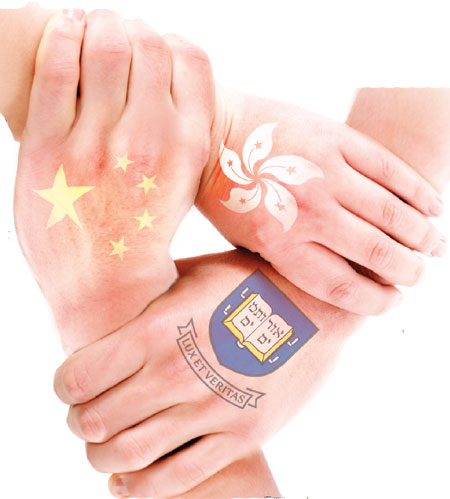
|
Yale President Peter Salovey (fifth from left), Yale alumnus Zhang Lei (middle) of Hillhouse Capital and Carol Li at a ceremony where SOHO China Foundation made a major donation to Yale University last year. Provided to China Daily |
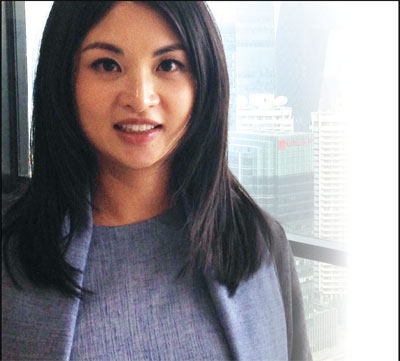
|
Carol Li (in white dress) stands next to Facebook COO Sheryl Sandberg (in red) with other founding members of Lean In Beijing. The group, a network of professional women, was inspired by the book Lean In, by Sandberg. |
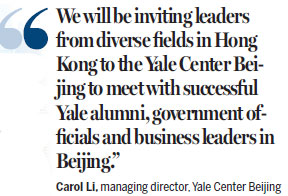
(HK Edition 03/23/2015 page7)
